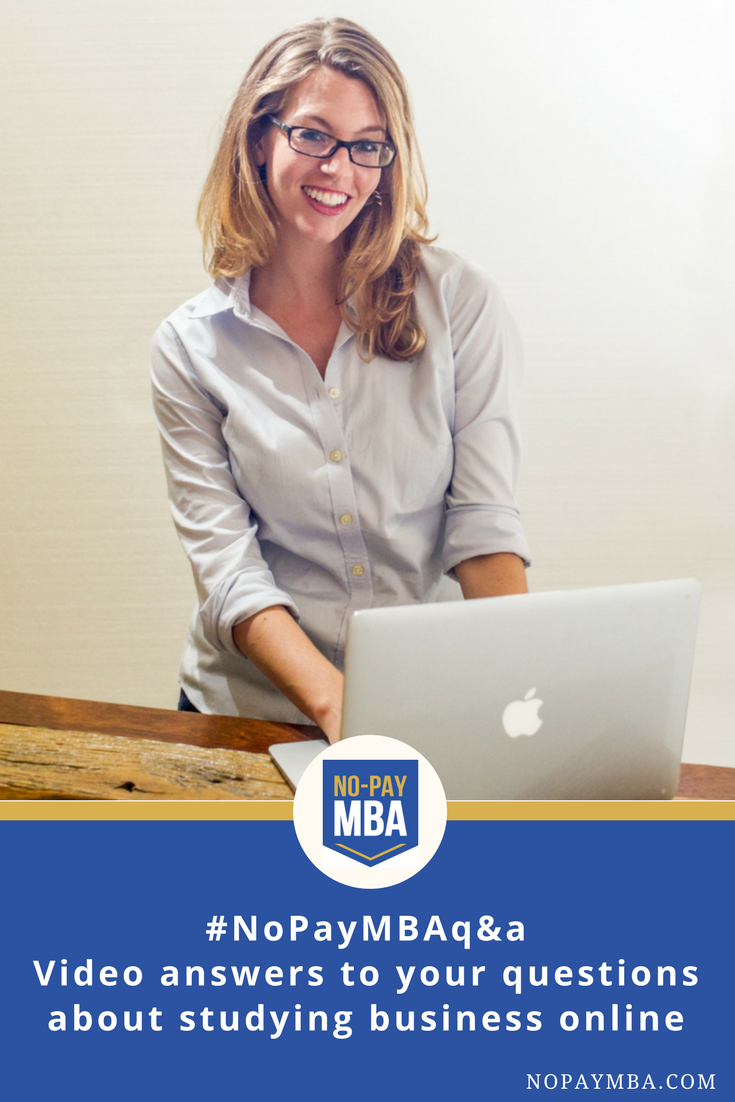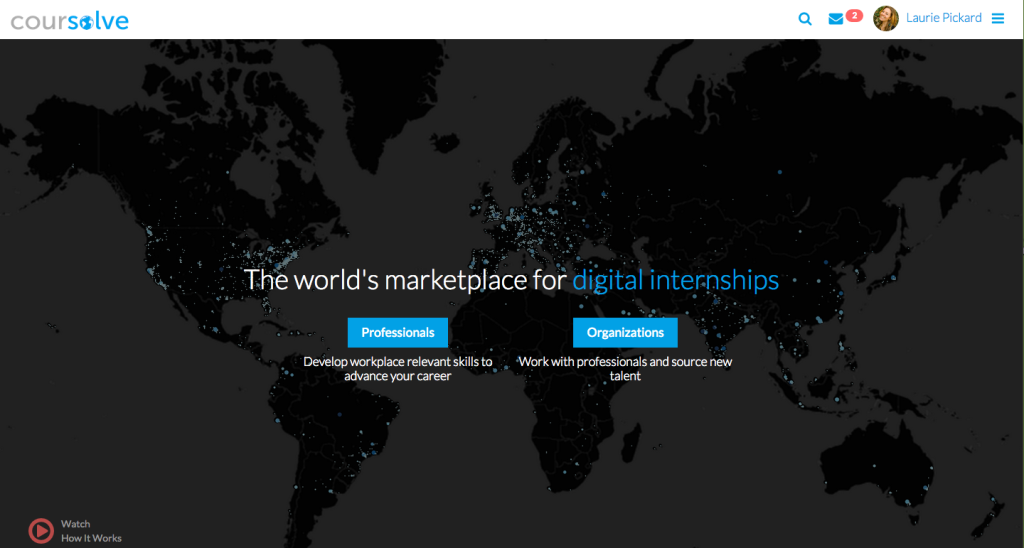by Laurie Pickard | Jun 24, 2015 | Career Development, Thoughts on Higher Ed and Life
This month the Lumina Foundation launched a national dialogue focused on transforming the credentialing system for higher education in the US. Here is my contribution to that discussion. I encourage readers to comment on this post or to add their voices to the discussion started by the Lumina Foundation.

Recently a reader of my blog sent me a link to a forum where a fascinating debate was taking place, spurred by the news that Coursera is phasing out its free Statements of Accomplishment for people who complete MOOCs. This debate crystallized around the question of whether credentials - not just MOOC credentials, but credentials in general - were worth anything.
“Portfolio trumps certificate,” says one contributor.
“Not in my country,” says another. “If you don’t have a certificate, good luck going through HR.”
“This is what’s wrong with employment,” a third chimes in. “I say this as a teacher who offers degree classes. You can earn a certificate without learning a damn thing.”
The discussion goes on at some length, but you get the idea.
So which is it? We all know that credentials (degrees in particular) are an absolute requirement to get certain jobs. But do they have to be? Can a portfolio ever win out over a credential? And what happens when Coursera completely gets rid of Statements of Accomplishment? Will MOOC students be obliged to pay for verified certificates in order for the courses to “count”?
How credentials work
Here at No-Pay MBA, we start from the premise that education has real value even when it it isn’t credentialed. In this article, I’ll explore credentials - what they are, what role they play in the marketplace, and whether it might possible to capture value from non-credentialed education.
To get started, let’s talk about the different types of credentials and look at how they function in the job market. I find it helpful to start by dividing credentials into two broad categories - degrees and all other credentials. I’ve heard David Blake, the CEO of Degreed refer to these categories as horizontal and vertical credentials. According to Blake, degrees are horizontal credentials; they level you up to a whole new category of job opportunities, lifting the floor underneath you.
Vertical credentials can be added on top of horizontal credentials, but they can’t be aggregated up to a horizontal credential at the next level. Most professional training courses fall into this category. Many fields recognize some type of non-degree credentials, but unlike degrees, these credentials are not generally understood outside of their field. Often if a non-degree credential is required, it must come with a degree, in the way that a teacher needs both a bachelor’s degree and a teaching certificate.
Are MOOCs just Sesame Street for adults?
 So what are MOOC course certificates, and what could or should they be? Should students be able to use them to build up to a horizontal credential like a degree? Or are MOOC certificates better understood as vertical credentials that are only valuable when stacked on top of a degree? Or maybe they’re neither - maybe MOOCs are best understood as edu-tainment, Sesame Street for knowledge-hungry adults. In which case, who cares if they come with any kind of credential at all?!
So what are MOOC course certificates, and what could or should they be? Should students be able to use them to build up to a horizontal credential like a degree? Or are MOOC certificates better understood as vertical credentials that are only valuable when stacked on top of a degree? Or maybe they’re neither - maybe MOOCs are best understood as edu-tainment, Sesame Street for knowledge-hungry adults. In which case, who cares if they come with any kind of credential at all?!
We can think about the possibilities for MOOC credentialing along a continuum. At one end of the spectrum, MOOCs are “just for fun,” personal edification that shouldn’t be taken seriously as professional training. There are plenty of people who will tell you that MOOCs are education for education’s sake, and that it’s impossible to capture any real value from them (in the form of a salary increase, for example).
At the next step along the continuum, MOOCs might be converted into more standard credentials. EdX’s partnership with Arizona State University is an example of this kind of arrangement; students can now take their entire first year of coursework at ASU via MOOC. After finishing the coursework, the MOOC certificates can be converted for credit at ASU. The same people who are saying that MOOCs are not capable of producing meaningful educational outcomes pooh-pooh such schemes as “credit laundering.”
At No-Pay MBA, we are at the opposite end of the spectrum. We believe it is possible to leverage a MOOC education for tangible career advancement, with or without a credential. And we think it’s only a matter of time before employers realize how valuable MOOCs can be. (In fact, they are already starting to.)
“If you don’t have a certificate, good luck going through HR.”
One big change that could bring efficiency into the hiring process would be the removal of the gatekeeping function of credentials that aren’t directly relevant to the jobs they keep people out of. The credential isn’t typically the only, or even the most important factor that determines whether you get a job, but as we all know, the lack of a credential can prevent you from getting one. But does it have to be this way?
I’m not opposed to degrees by any means; I have two of them, and I value them both, as well as the education they represent. But I do find it rather silly that HR requires a master’s degree - any master’s degree - for my current job, even though my master’s program in geography has very little relevance to my day-to-day work.
Here’s another thing I find a bit nonsensical about the way horizontal credentials work. Most people get their degrees fairly early in their careers and have finished their formal higher education before they are even 10 years into a work life that may span four decades.
The credential that you earn at age 22 or 25 doesn’t signal that you are at the top of your field, but rather that you are prepared to begin working in that field. Very often, the credential whose absence can keep someone out of a job doesn’t even signal work readiness for a particular field but instead serves as a signal of general competence. (Art history majors, anyone? Geography majors, for that matter?) And yet, even 15 years into a career, not having a degree or not having the right degree can still mean that you aren’t able to get a job that you are capable of doing.
One of the exciting things about MOOC education is that it is laying bare some of the contradictions in credentialed education. Why should it be necessary to have a degree just for the sake of having a degree, if there are other ways to get an education? If you can do the work, why should the credential you hold matter at all?
If the only reason to have a degree is because HR said so (not a very good reason), then it might be possible for MOOCs and other non-credentialed education to offer other pathways to employment. The company that finds alternative ways to select candidates for work readiness stands to clean up in the talent market.
Multiple pathways from education to employment
Of course, I don’t think HR policies are going to change tomorrow. But I do think it is possible for people who already hold degrees to demand that their efforts at continuing education be taken seriously. Let me start: I have a master’s degree, and I am telling you that my business education, which is entirely MOOC-based, is more relevant, useful, and applicable, than either of my degrees when it comes to preparing me for the work that I do. And I can back up that claim with a portfolio that shows how I’ve put my education into practice. (I’ll be publishing it on this website very soon.) Can I get you (employer) to trust me when I say that I have a business education equivalent to an MBA? I believe that I can.
I imagine a future in which there are multiple pathways from education to employment. The traditional, degree-based pathway remains. But non-credentialed educational pathways are also available, when backed up by strong portfolios. As a middle ground, competency-based programs can credential learning that takes place outside of traditional universities.
Wouldn’t many people benefit from this kind of flexibility? I know I have.
by Laurie Pickard | Jun 13, 2015 | Thoughts on Higher Ed and Life

I recently asked readers of the blog and followers of No-Pay MBA on Facebook to submit their questions regarding studying business online so that I could answer those questions with personal video messages. Many people submitted questions. Below are the video messages I sent out in response.
#NoPayMBAq&a Video 1
In the first video I answered questions about getting started on a MOOC-based MBA equivalent and how MOOCs differ from a traditional classroom environment.
#NoPayMBAq&a Video 2
In the second video I discussed why it might not matter if you don’t get a degree at the end of your business studies, ways that MOOCs might actually lead to degrees, and the value of verified certificates.
#NoPayMBAq&a Video 3
In the final video I shared some tips on how to present your MOOC MBA education and talked about how employers view MOOC-based business education, who can benefit from this form of education, and future directions for No-Pay MBA.
I hope you enjoy these videos!
by Laurie Pickard | May 30, 2015 | Career Development

It’s hard to believe it’s been almost two years since I started the No-Pay MBA project and wrote the first words on this blog. When I started this project, my goal was simply to answer the question, “Would it be possible to create my own MBA using free online courses and other cheap or free materials?” I set up a website to document my studies and a blog focused on answering that question.
During the past two years, my thinking about online education has evolved just as much as my thinking about business has. First, I was able to answer that original question of whether it is possible to get a great business education – an MBA equivalent – using free online resources. The answer is a resounding yes! Second, I discovered just how many people are interested in low-cost, accessible business education. There are thousands of us around the world.
With these two realizations the focus of the No-Pay MBA website shifted from documenting and legitimizing my own studies to serving as a resource to other people seeking to get a business education without having to spend their life savings.
Now, I’m coming full circle. June 2015 marks a critical transition for No-Pay MBA. Over the course of this month, No-Pay MBA will go from a blog site to a web-based business.
No-Pay MBA’s mission is to provide information, advice, and support to help you get a great business education, equivalent to an MBA, based on the content that is freely available on the web. In launching a business, my hope is that No-Pay MBA can provide more and better services to a greater number of people.
I can’t wait to start watching this community grow and to see what you will contribute to it.
Through my own studies, I’ve discovered that a true business education must be a social experience; you can’t get the equivalent of an MBA just by taking courses. A business education involves getting out of the classroom, building a network, presenting yourself with confidence, and learning how to cooperate and negotiate.
That’s why in addition to providing a general framework for studying business via MOOC and advice on how to craft your personal business education, I aim to create a community where you can experience the social benefits that come with a traditional university education.
For me, that community is the most valuable thing that No-Pay MBA has to offer. I’ve tried to launch as quickly as humanly possible in large part because I can’t wait to start watching this community grow and to see what you will contribute to it.
I’m planning a lot of exciting activities throughout the month, both to mark the transition from blog to business and to make sure I answer all of your questions in the lead-up to launch. These activities will also include chances to meet and interact with your peers, people from all over the world who are considering or have already started No-Pay MBAs. You can stay informed about everything that’s coming by pre-registering to start your No-Pay MBA if you haven’t done so already.
by Laurie Pickard | May 11, 2015 | Community and Networking
It’s widely accepted that one of the most valuable components of a traditional MBA is the business school network. For aspiring entrepreneurs, some of the most valuable connections in that network are peers who may one day become co-founders or business collaborators.
After the degree question, one of the questions I am asked most frequently about my No-Pay MBA is whether I am missing out on MBA network. The answer? Not at all! Over the course of my studies, I have built an incredible network of MOOC MBA students, ed tech entrepreneurs, and others.
Even without the advantages that come from blogging and being covered by the media, I believe it is possible for you to build an incredible network to go along with your MOOC-based business studies, particularly if you are interested in entrepreneurship or in working for a startup.
To illustrate this point, I’d like to introduce you to Kevin Meldau.
Kevin Meldau, Founder of Global Teaching Adventures
 I met Kevin when he reached out to me to explore possibilities for collaboration. Kevin is a natural entrepreneur. Trained as a graphic designer, he worked for several years in graphic design, including on some very high-profile projects. But while he enjoyed the design aspect of the work, he found the overall work environment too restrictive.
I met Kevin when he reached out to me to explore possibilities for collaboration. Kevin is a natural entrepreneur. Trained as a graphic designer, he worked for several years in graphic design, including on some very high-profile projects. But while he enjoyed the design aspect of the work, he found the overall work environment too restrictive.
So, a few years into a very promising graphic design career in his native South Africa, he ditched it all and moved to Thailand with a backpack and little else. After trekking around the country for several months, Kevin started to notice that schools in many smaller towns were desperate for English teachers. Again and again, in town after town, he was asked if he would be willing to provide some instruction to students who had never interacted with a native speaker of English.
Kevin wanted to help, but by himself he could only work with a limited number of schools at a time. He saw an opportunity both to help out more schools and to provide travel experiences for English-speakers with a desire to explore Asia. Fast forward a few years, and Kevin’s company Global Teaching Adventures trains people to teach English and places them in school in Thailand, South Korea, and China.
“Asian society is class-oriented. If you are poor, there are few opportunities to move up in life. The one concrete path to middle class for lower-income Asians is through learning to speak English,” says Kevin. “I tell all of our English teachers that they should feel proud to be teaching something that is so important in helping to build more prosperous lives.”
As an education entrepreneur, Kevin is always excited about building his business acumen and exploring new developments in his field. MOOC-based business education sits right at the intersection of those two themes, and that is what brought Kevin to me.
In addition to being a successful entrepreneur, a MOOC MBA student, and a key member of my startup team, Kevin is also a brilliant networker. I have learned a great deal from his approach to networking, and I’d like to share some of those lessons.
Below are some tips on building your network during a No-Pay MBA by networking like an entrepreneur, based on Kevin’s methods.
How to Network Like An Entrepreneur
1. Know the trends in your industry.
A first step in networking like an entrepreneur is to understand the trends affecting the industry you are in or would like to move into. What are the potential disruptors? What innovation is taking place? Who is writing and speaking about the industry? Where are those conversations happening? What publications, websites, and discussion forums are most active with conversation about changes in the industry? What is the media coverage of the industry?
Kevin recognized the potential of MOOC education to change his industry. He saw that No-Pay MBA was one of the places where the conversation about MOOC education was taking place, and he wanted to be involved. “I have a feeling that MOOC culture is going to blow up in a big way,” Kevin told me. “Being on the first wave of this really excites and motivates me.”
2. Find your peers.
It’s all well and good to know the names of the CEOs of the most prominent companies in your industry. But don’t start by reaching out to people at the very top. Instead, look for people who are working in the industry at a variety of levels, including people who are at the same level in their careers as you are, or who are just a bit farther along than you are. How do you do that? Search LinkedIn, check out who is active on discussion forums, reach out to people in MOOC courses, or go old school and ask people you know personally if they can introduce you to anyone. Take part in the discussions that are happening, and make connections with people who share your interests.
Kevin and I were both students in MITx’s Entrepreneurship 101 and 102. Business MOOCs in general - and these two courses in particular - are a great place to meet future founders and collaborators, just as Erdin Beshimov suggested when I spoke with him and Professor Bill Aulet about MOOC education.
3. Reach out to people who are building something and make a great first impression.
People who are already building something - whether that be a company, a blog, a website, an online community - are a great resource to have in your network, and they are usually very open to making new connections. The key is to make a good first impression. When Kevin reached out to me, I was immediately impressed with how he presented himself, and I wanted to know more about him. That is exactly the reaction you should strive for when contacting someone you don’t know. Your message should be short, to the point, and professional (i.e. no typos, no grammatical errors). It also helps to include a link to more information so that the person you are reaching out to can choose to learn more about you. That could be your LinkedIn profile, a personal website, or a portfolio.
Cold emailing is stressful, but Kevin recognizes that it can sometimes pay off in a big way. “I don’t do it often, but when I do, I keep the message short and to the point, and I almost never say what I want in the first message. I’ve gotten a positive reaction most of the time.”
4. Express genuine interest, and be helpful.
When people are passionate about something, they enjoy talking with others who share their passion. At the same time, most people are turned off by someone who is clearly trying to get something from them. This certainly goes for startup entrepreneurs, who are full of passion but also totally time-crunched. Therefore, when you reach out to someone, express interest in their work and in learning more about it. Don’t lead with a request for their time or their help. Instead, start by establishing common ground, expressing a desire to learn more, and being helpful rather than asking for anything.
Given his background in graphic design, Kevin was able to offer some graphic design help to me that has been absolutely critical to the launch of my business. (He designed my new logo! Isn’t it cool?) But you don’t need to be a graphic designer to approach networking with a spirit of helpfulness. Helping out doesn’t have to be a big thing either. Sometimes simply making an introduction to someone in your network, providing feedback on something the person is working on, or sending a link to an article you discussed in your conversation is all it takes. When your new connection takes you up on your offer to help, be prompt and professional, and you will go a long way towards cementing the relationship.
5. Build on the connections you’ve already made.
This is where I have been truly impressed with Kevin as a networker. My dream for the No-Pay MBA community is to build a network among MOOC MBA students that is as valuable as the traditional business school network. This is a service I am not even officially offering yet, but seeing how Kevin has engaged with No-Pay MBA’s connections has given me great confidence that such a network can indeed be built. Through the existing No-Pay MBA network, as small and informal as it is, Kevin has found SEO services for Global Teaching Adventures, explored possibilities for an import-export business, and talked with several entrepreneurs in the MOOC space, all by building on our initial connection and shared interests.
by Laurie Pickard | May 3, 2015 | Career Development, Courses, Platforms, and Profs, MOOC MBA Design

The basic hypothesis of the No-Pay MBA is simple: thanks to the advent of massive open online courses, a person who would be capable of completing a master’s in business administration at a university can get an equivalent education without paying business school tuition, using freely available resources.
Most people I talk to seem to accept this premise. The general consensus is that it is indeed possible to learn online and that at least in terms of course content, the education I am getting is equivalent to a regular MBA.
Where things get complicated is at the end of the education. How will my studies be recognized? Who will care that I did enough courses to match a traditional MBA? The job market is degree-driven. Without that piece of paper will I have anything of value when I “graduate” in May 2016?
I’m not bothered by the fact that I won’t be getting a degree because I can see a different path to legitimacy – importantly, one that does not revolve around blogging and does not rely on any special advantage that I might have as the first person to publicly replicate the MBA using MOOCs.
Turn a MOOC education into career advancement
The key to converting a MOOC education from personal development to career advancement is to put that education into practice in a job. We all know that in many industries a bachelor’s degree is a gatekeeper – if you don’t have one, you simply won’t be hired. But if you already have a degree and have been working for a few years, direct experience almost always trumps classroom education. Your degree may help get you in the door, but your experience and your performance on the job ultimately overshadow your degree in their importance.
When you use your MOOC business education in a work setting, you turn it from a series of facts you’ve learned on your laptop into a set of skills you can leverage for a promotion or in your next job search.
Okay, I can hear you saying, that’s all fine and good if you’re already working and can convince your employer to let you take on new responsibilities. But what if you’re not working? Or if your employer is unwilling or unable to increase your responsibilities? Or if you’d like to change industries and can’t find a relevant way to employ your new skills in your current job?
Digital internships for MOOC students
For MOOC students, this is where Coursolve comes in. If you’ve been reading the blog, then you may know that I’ve been excited about Coursolve since learning about their work as a student in Foundations of Business Strategy. Coursolve connects learners from anywhere in the world with businesses and organizations through “digital internships,” collaborative short-term projects that are often linked with MOOC course content.
As a student in Foundations of Business Strategy, I used Coursolve’s platform to find a business for whom I could conduct a strategic analysis as a final course project. Coursolve itself had posted a strategic analysis internship, and given my interest in all things MOOC, I chose to conduct a strategic analysis for Coursolve. The best part? Based on the quality of my work, Coursolve hired me to work on business development – not because I had an MBA but because they had seen how I work first hand.
Businesses can benefit from digital internships
Now that I’m launching a business, I need Coursolve’s platform again. Over the next several months, I’ll be posting my own digital internship – only this time I’m a business owner looking for talented students who want to use their skills in a practical setting. There are several reasons why as a small business owner it makes sense for me to post a digital internship on Coursolve.
First, I’m still learning, and I’m looking to hone my management skills. A digital internship is a low-stakes way for me to improve my ability to manage people who are not physically located in the same place – a key skill given the structure of my business.
Second, I’m looking to build relationships with talented people. While I don’t have immediate hiring needs, I’m excited to work with people who can help build momentum for my business and who I may one day be able to employ.
Third, I’m building my brand. By providing educational experiences to students I’m both paying forward my own experience as an intern and generating good will towards the No-Pay MBA.
And by the way, these benefits don’t just apply to small businesses. Larger businesses can also source talent, promote their brands, and provide management experience to their employees through digital internships.
Join the No-Pay MBA’s digital internship on Coursolve
The No-Pay MBA internship is designed to be done in conjunction with the course Foundations of Business Strategy, taught by Michael Lenox of the University of Virginia’s Darden School of Business. If you’re interested in working with me on this digital internship, here’s how to sign up.
1. Register for Foundations of Business Strategy through Coursera. It’s one of Coursera’s on-demand courses, so it’s available all the time.
2. Go to www.Coursolve.org. Click on the Login button and create a profile.
3. Using the menu in the upper right corner, click Browse under the word Needs. The No-Pay MBA internship is listed in the Business Strategy/Innovation category.
The project involves applying several of the strategic analyses Professor Lenox teaches in his course to the No-Pay MBA business I am launching next month. You will put those analyses together into a final report, which will become part of your educational portfolio. If you do an outstanding job, I’ll be happy to write you a recommendation. I’m looking forward to seeing what you come up with.
 So what are MOOC course certificates, and what could or should they be? Should students be able to use them to build up to a horizontal credential like a degree? Or are MOOC certificates better understood as vertical credentials that are only valuable when stacked on top of a degree? Or maybe they’re neither - maybe MOOCs are best understood as edu-tainment, Sesame Street for knowledge-hungry adults. In which case, who cares if they come with any kind of credential at all?!
So what are MOOC course certificates, and what could or should they be? Should students be able to use them to build up to a horizontal credential like a degree? Or are MOOC certificates better understood as vertical credentials that are only valuable when stacked on top of a degree? Or maybe they’re neither - maybe MOOCs are best understood as edu-tainment, Sesame Street for knowledge-hungry adults. In which case, who cares if they come with any kind of credential at all?!




 I met Kevin when he reached out to me to explore possibilities for collaboration. Kevin is a natural entrepreneur. Trained as a graphic designer, he worked for several years in graphic design, including on some very high-profile projects. But while he enjoyed the design aspect of the work, he found the overall work environment too restrictive.
I met Kevin when he reached out to me to explore possibilities for collaboration. Kevin is a natural entrepreneur. Trained as a graphic designer, he worked for several years in graphic design, including on some very high-profile projects. But while he enjoyed the design aspect of the work, he found the overall work environment too restrictive.

